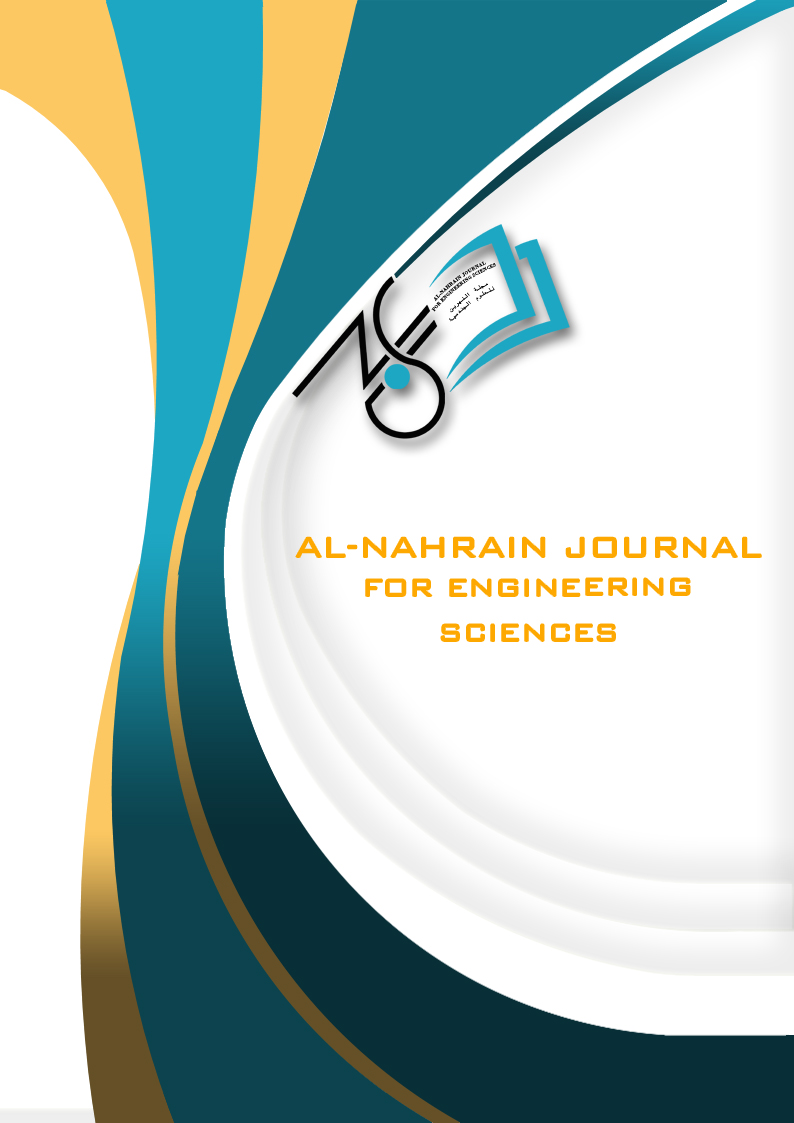Characterization of Laser Structuring on AISI 304 Stainless Steel
DOI:
https://doi.org/10.29194/NJES.28010061Keywords:
Laser, Stainless Steel, RoughnessAbstract
Super-hydrophobic is the tendency of a surface to spit out water droplets. Only a surface with high apparent contact angle (>1500), low contact angle hysteresis (<100), low sliding angle (<50), and strong Cassie model state stability is considered a super-hydrophobic surface. In an attempt to create highly hydrophobic synthetic surfaces suitable for a range of uses, attempts have been made to mimic the super-hydrophobicity found in natural materials (such as lotus leaves). Due to its wide range of applications including waterproof, anti-fog, anti-ice and anti-corrosion surface, the laser processing process achieved the use of process parameters which had a significant impact on the roughness factor. High roughness factor F. At constant values of p = 3 mW and ω = 10 μm, at scanning speeds of 6000 mm/s.
Downloads
References
Applications of laser-induced periodic surface structures (LIPSS). InLaser-based Micro-and Nanoprocessing XI 2017 Feb 17 (Vol. 10092, pp. 114-122). SPIE. DOI: https://doi.org/10.1117/12.2250919
Dong L, Samson B. Fiber lasers: basics, technology, and applications. CRC press; 2016 Sep 19. DOI: https://doi.org/10.1201/9781315370521
Snitzer, E. 1961. Proposed ber cavities for optical masers. J. Appl. Phys. 23:36–9. 2. DOI: https://doi.org/10.1063/1.1735955
Koester, C. J. and E. Snitzer. 1964. Amplication in a ber laser. Appl. Opt. 3:1182–6. DOI: https://doi.org/10.1364/AO.3.001182
Torrisi L, Borrielli A, Margarone D. Study on the ablation threshold induced by pulsed lasers at different wavelengths. Nuclear Instruments and Methods in Physics Research Section B: Beam Interactions with Materials and Atoms. 2007 Feb 1;255(2):373-9. DOI: https://doi.org/10.1016/j.nimb.2006.12.144
Schwibbert K, Richter AM, Krüger J, Bonse J. Laser‐Textured Surfaces: A Way to Control Biofilm Formation?. Laser & Photonics Reviews. 2024 Jan;18(1):2300753. DOI: https://doi.org/10.1002/lpor.202300753
J. Bonse, S. Hohm, S. V. Kirner, A. Rosenfeld, and J. Kruger, “Laser-Induced Periodic Surface Structures-A Scientific Evergreen,” IEEE J. Sel. Top. Quantum Electron., vol. 23, no. 3, pp. 109–123, 2017, doi: 10.1109/JSTQE.2016.2614183. DOI: https://doi.org/10.1109/JSTQE.2016.2614183
C. Florian, S. V. Kirner, J. Krüger, and J. Bonse, “Surface functionalization by laser-induced periodic surface structures,” J. Laser Appl., vol. 32, no. 2, p. 022063, 2020, doi: 10.2351/7.0000103. DOI: https://doi.org/10.2351/7.0000103
Marquis C, Tilcsik A. Imprinting: Toward a multilevel theory. The Academy of Management Annals. 2013 Jun 1;7(1):195-245. DOI: https://doi.org/10.5465/19416520.2013.766076
Mastellone M, Pace ML, Curcio M, Caggiano N, De Bonis A, Teghil R, Dolce P, Mollica D, Orlando S, Santagata A, Serpente V. LIPSS applied to wide bandgap semiconductors and dielectrics: Assessment and future perspectives. Materials. 2022 Feb 13;15(4):1378. DOI: https://doi.org/10.3390/ma15041378
Dutta Majumdar J, Manna I. Laser material processing. International materials reviews. 2011 Nov 1;56(5-6):341-88. DOI: https://doi.org/10.1179/1743280411Y.0000000003
R. Buividas, P.R. Stoddart, S. Juodkazis, Annalen der Physik 524 (2012) DOI: https://doi.org/10.1002/andp.201200140
Mezera M, Florian C, Römer GW, Krüger J, Bonse J. Creation of material functions by nanostructuring. Ultrafast Laser Nanostructuring: The Pursuit of Extreme Scales. 2023 Apr 7:827-86. DOI: https://doi.org/10.1007/978-3-031-14752-4_23
Sarakinos K, Alami J, Konstantinidis S. High power pulsed magnetron sputtering: A review on scientific and engineering state of the art. Surface and coatings technology. 2010 Feb 25;204(11):1661-84. DOI: https://doi.org/10.1016/j.surfcoat.2009.11.013
Chemical composition of AISI 304 stainless steel.
Elfghi FM. A hybrid statistical approach for modeling and optimization of RON: A comparative study and combined application of response surface methodology (RSM) and artificial neural network (ANN) based on design of experiment (DOE). Chemical Engineering Research and Design. 2016 Sep 1;113:264-72. DOI: https://doi.org/10.1016/j.cherd.2016.05.023
Jagadish, Bhowmik S, Ray A. Prediction and optimization of process parameters of green composites in AWJM process using response surface methodology. The International Journal of Advanced Manufacturing Technology. 2016 Nov;87:1359-70. DOI: https://doi.org/10.1007/s00170-015-8281-x
K.S. Anastasiou, Optimization of the aluminium die casting process based on the Taguchi method, Proc. Inst. Mech. Eng., Part B: J. Eng. Manuf. 216 (7) (2002) 969–977. DOI: https://doi.org/10.1243/09544050260174175
S. Basavarajappa, G. Chandramohan, J. Paulo Davim, Application of Taguchi techniques to study dry sliding wear behaviour of metal matrix composites, Mater. Des. 28 (4) (2007) 1393–1398. DOI: https://doi.org/10.1016/j.matdes.2006.01.006
S. Ghosh, P. Sahoo, G. Sutradhar, Tribological performance optimization of Al7.5% SiCp composites using the Taguchi method and grey relational analysis, J. Compos. 2013 (2013) 1–9. DOI: https://doi.org/10.1155/2013/274527
Podstawczyk D, Witek-Krowiak A, Dawiec A, Bhatnagar A. Biosorption of copper (II) ions by flax meal: empirical modeling and process optimization by response surface methodology (RSM) and artificial neural network (ANN) simulation. Ecological Engineering. 2015 Oct 1;83:364-7. DOI: https://doi.org/10.1016/j.ecoleng.2015.07.004
Downloads
Published
Issue
Section
License
Copyright (c) 2025 Sarah Sabah Edan, Rana M. Taha

This work is licensed under a Creative Commons Attribution-NonCommercial 4.0 International License.
The authors retain the copyright of their manuscript by submitting the work to this journal, and all open access articles are distributed under the terms of the Creative Commons Attribution-NonCommercial 4.0 International (CC-BY-NC 4.0), which permits use for any non-commercial purpose, distribution, and reproduction in any medium, provided that the original work is properly cited.














